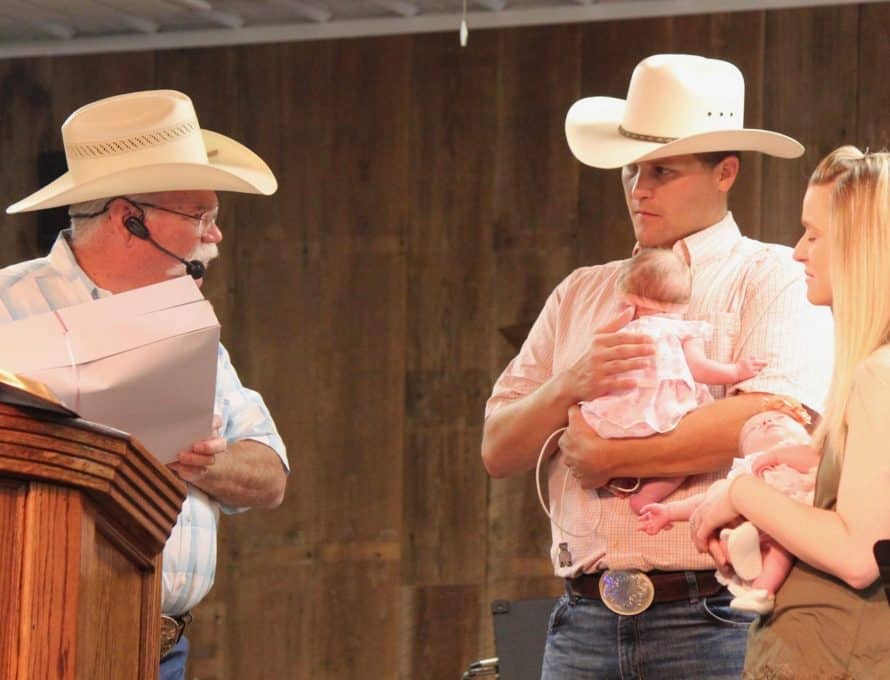CARTHAGE – Missouri Baptist church planter Steve Stafford has a rule for his congregation: Never steal members from other churches.
“We call that cattle rustling,” Stafford, the founding pastor of Risen Ranch Cowboy Church here said.
In Jesus’ parable, a shepherd left his 99 sheep to seek one stray. It’s an image that cowboys, experienced in seeking stray cattle, might appreciate. And Stafford, like other cowboy church planters around the state, is working to round up the unreached people of rural Missouri.
“We started out with four guys under a shade tree,” he said about Risen Ranch’s start in 2011. Soon four men became 15 people under a shade tree, and in the winter the growing congregation found shelter from the cold by meeting in an in-door arena. Now, because of his congregation’s eagerness to reach others, Stafford baptizes an average of 45 people each year, ranging from ages 12 to 78. And 85 percent of Risen Ranch’s members have no church background. Often, as a result, he’ll baptize family members together—as when he baptized three generations of unchurched women: daughter, mother and grandmother.
“We have bought and given away hundreds of first-time Bibles to adults – 40, 50, 60 years old – who didn’t even own a Bible,” Stafford said. “We have been able to reach a culture that has dropped through the cracks. That’s what’s exciting to me about this work and about Risen Ranch Cowboy Church.
According to Mark Fugitt, a Missouri Baptist Convention field assistant, the need to reach the people of rural Missouri is great – and the need is becoming more apparent over time.
In years past, some may have assumed that rural Missouri was “God’s country,” with a church – or possibly a few churches – in every town. But now, Fugitt said, “some of the mainline, flagship First Baptists are closing. They’re dying. They’re falling behind. That’s where we’re starting to see this great vacuum of gospel presence. You can go into towns and see three or four churches closed. Is this because they all started going to a bigger church down the road? Or is this because, in a lot of towns, they just closed and nothing stepped in to take their place?”
Although not every rural Missourian is a cowboy, Fugitt said that Missouri Baptist cowboy churches are playing an important part in bringing the gospel to the rural population.
“I love what a lot of the cowboy churches are doing,” he said. “What I’m finding in the cowboy churches is that they’re not just reaching the cowboys. People like that style. They like the casual feel. They like the way the gospel is presented. So they actually are bridging a lot broader gap than what they even originally thought they would.”
Fugitt said that most unchurched rural Missourians don’t hate church. Rather, some find church simply irrelevant, and some find more traditional styles of church uncomfortable.
For this reason, Risen Ranch Cowboy Church meets in an untraditional building, adjacent to an outdoor arena where they host an annual “Horsemanship Bible Camp”—their version of VBS—and rodeo events for outreach. On entering Risen Ranch’s building, one visitor told Stafford that it looked like his machine shed with chairs in it. “I can do this,” he added. Other visitors are excited to learn that dogs are welcome in the building.
But according to Stafford, this isn’t the main reason why Risen Ranch and other cowboy churches are able to reach unchurched rural Missourians.
“We started this church by meeting them where they’re at – at the stock yards, at the rodeos, at horse shows, at county fairs,” Stafford said. “We took the church to them before we ever invited them to come to the church. … That is our mindset – taking the gospel out.”
Indeed, Risen Ranch has been active in multiplying churches across Missouri and around the nation and globe. Former members are now heading up church plants in Illinois and Kansas, and Risen Ranch sends a team each year to Keensburg, Colo., where they help with a rodeo Bible camp. They’ve also sent a short term mission team to Peru to minister alongside 15 church planters there.
“Our goal is to get more globally-minded,” Stafford said, adding that the church is also “able to reach a lot of people without meeting them through the Cooperative Program.”
The Cooperative Program is the funding process Southern Baptists have used since 1925 to support missions and evangelism at the state, national, and international levels. Through Cooperative Program, Missouri Baptist churches are multiplied, revitalized and mobilized to transform lives and communities around the world.
Stafford expressed his gratitude to Missouri Baptists for supporting the Cooperative Program.
“Church planting will starve to death on its own,” he said. “Without the Cooperative Program, we would have starved to death. … Especially back in the early days, without the financial help that we received through the Cooperative Program, it would have been so much more difficult to start (this church). We had no money. We had no chairs. We had nothing when we started. But through the Cooperative Program and through the Missouri Baptist Convention, who believed in what we were doing, Missouri Baptists provided most of the resources that we needed in those early years.”
But the impact of the Cooperative Program goes beyond resources, he said. The impact is seen in the transformed life of a 53-year-old unchurched, rural Missourian who once called Stafford and, with excitement, shared that he had just bought his first Bible.

